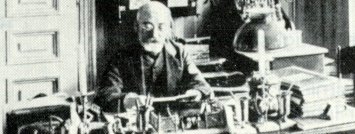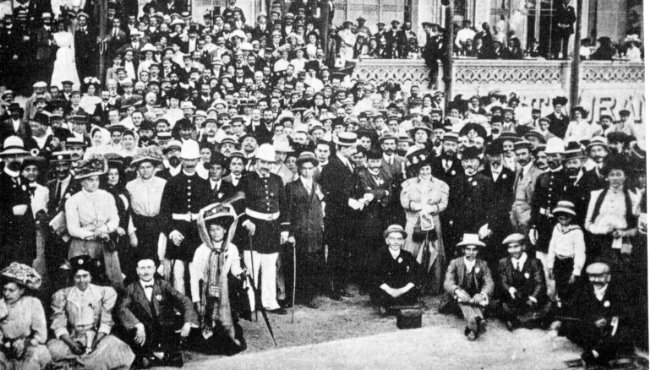




| En espaņol. |
| En Esperanto |





 Every time a new congress year starts, all esperantists who foresee some free time and can save some money starts getting ready for the next Esperanto Congress. Friends bound by the same idea, the same aspirations and hopes say to each other see you!, and they hope for that occasion hopefully. Like brothers who love one another and can see one another only sometimes at their parents', in such a way esperantists long for that moment when they can meet at the middle of the Land of Esperanto, greet warmly one another, shake their hands and say we are alive, we worked honestly for the whole year, we held our home's honor, we can partake with a clean conscience our family's common feast!
Every time a new congress year starts, all esperantists who foresee some free time and can save some money starts getting ready for the next Esperanto Congress. Friends bound by the same idea, the same aspirations and hopes say to each other see you!, and they hope for that occasion hopefully. Like brothers who love one another and can see one another only sometimes at their parents', in such a way esperantists long for that moment when they can meet at the middle of the Land of Esperanto, greet warmly one another, shake their hands and say we are alive, we worked honestly for the whole year, we held our home's honor, we can partake with a clean conscience our family's common feast!
 But while you all are getting ready for the trip to the common feast with a light heart, I do the same with a heavy one, because in our congresses luck gave me a role which is both flattering and cumbersome: I must accept honors which do not belong to me. Properly or not, the world see in me always the natural representative of the esperantist ensemble, the symbol of esperantism, of the esperantist loyalty and unity; since because people cannot express their feelings to something abstract, every declaration of sympathy and enthusiasm for Esperanto is directed to me.
But while you all are getting ready for the trip to the common feast with a light heart, I do the same with a heavy one, because in our congresses luck gave me a role which is both flattering and cumbersome: I must accept honors which do not belong to me. Properly or not, the world see in me always the natural representative of the esperantist ensemble, the symbol of esperantism, of the esperantist loyalty and unity; since because people cannot express their feelings to something abstract, every declaration of sympathy and enthusiasm for Esperanto is directed to me.
There are, however, people who do not understand this, or who do not want to understand it. They envy the flag because of the honors which are made to it; they see in myself the person to whom the role of a king is given. This is why I always come to the congress with a heavy heart. Very vehemently I would like to refuse this role which torments me so much and not be in front of you all, but among you; but the thing does not depend upon my will, it depends on the various circumstances before which I must bend, unless I wanted to damage our movement. Thus why today I am also in front of you as your specific representative: I accept everything which is directed to you, and I have always forwarded it faithfully to you, Esperantist People.
From my role as your representative I would draw your attention to the great honor which His Majesty the King Alphonse XIII made us, by accepting most kindly the honorary presidency of our congress. I thank, on your behalf and mine, him with our most respectful thanks to His Royal Majesty. Long live King Alphonse XIII!
I also draw your attention to the great sympathy which the rulers of this country has shown to our matter: not only every minister supported our congress, but also the government of the nation invited officially the governments of other countries to send their own delegates to our congress. In my name and in the name of you all I thank the Government of the Kingdom of Spain most warmly.
You know with how much energy and care the local organizing committee worked for the beautiful and fruitful preparation of this congress. You know that they did not lose their courage, even in spite of the unfortunate happenings in Barcelona, which made us think that the congress in Barcelona was absolutely impossible to hold. You have already seen part of what the committee have done, the rest you will see during the congress itself and in the days after the congress. I thank this very diligent committee, specially its dear president, in my name and in the name of you all.
You have also seen how amazing and sympathetic acceptance was prepared for us by the City of Barcelona. You know that only special unforeseen circumstances prevented the city to show all their enthusiasm and esteem in all their magnitude, to you, Esperanto people, to your toil and labor, to your goals and hopes. In your name I express to the city our deepest and most sincere thanks.
In the congress I have always had something to tell you, thus at the end of the congress I spoke longer. However, today I have nothing important to tell you, and therefore I will speak short. You know what kind of goal we have; let's march onward diligently and in harmony. If we are asked what we did in this year between congresses, we can answer: We lived healthily, we grew, we got stronger in every way. The great meaning of this can be understood only by those who understand all the importance and difficulty of our business, specially those who worked for it themselves. As in the passed years, also in this year just finished many of you have worked for our common goal with great ardor and generosity; to them the Esperanto world express their warmest thanks. But during the Congress we not only will tell us about the work already done,  but we must also achieve several common tasks which demand agreements and accord.
but we must also achieve several common tasks which demand agreements and accord.
Let's start our congress labor in a happy moment and feast. Let's try to give the former its best success, and let's gather courage and forces for the works ahead, in the coming year.
L.L. Zamenhof